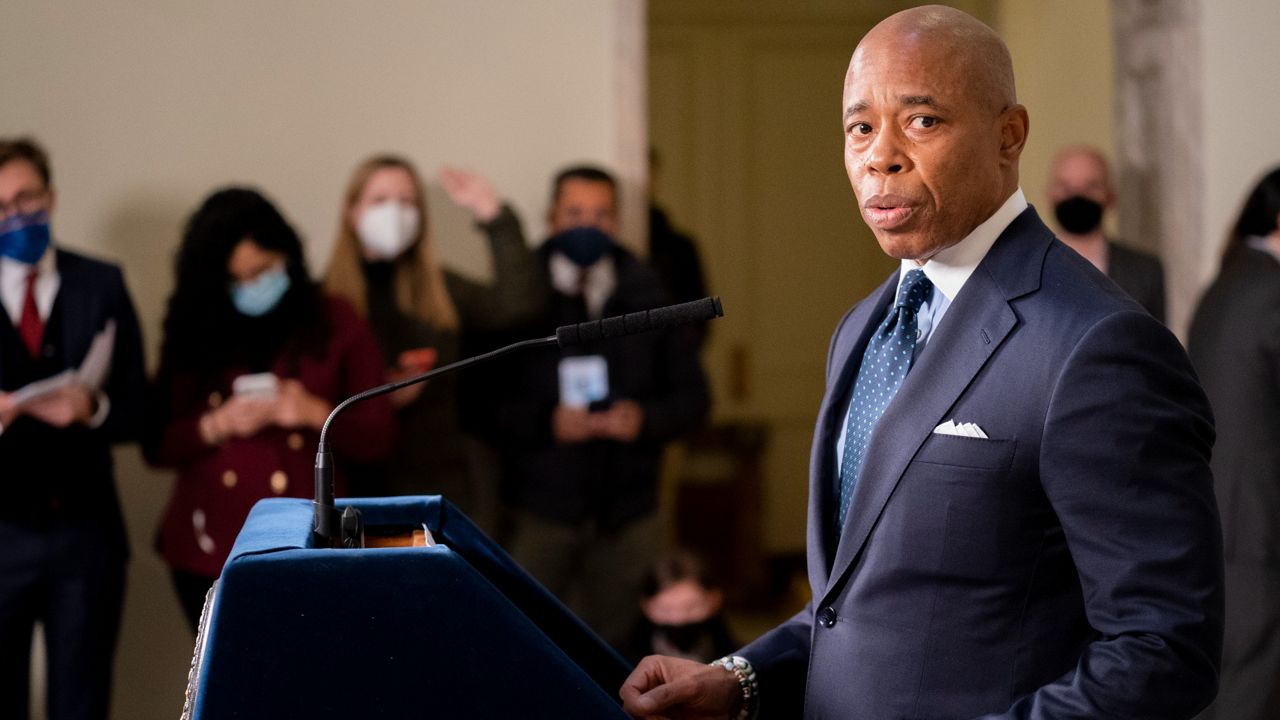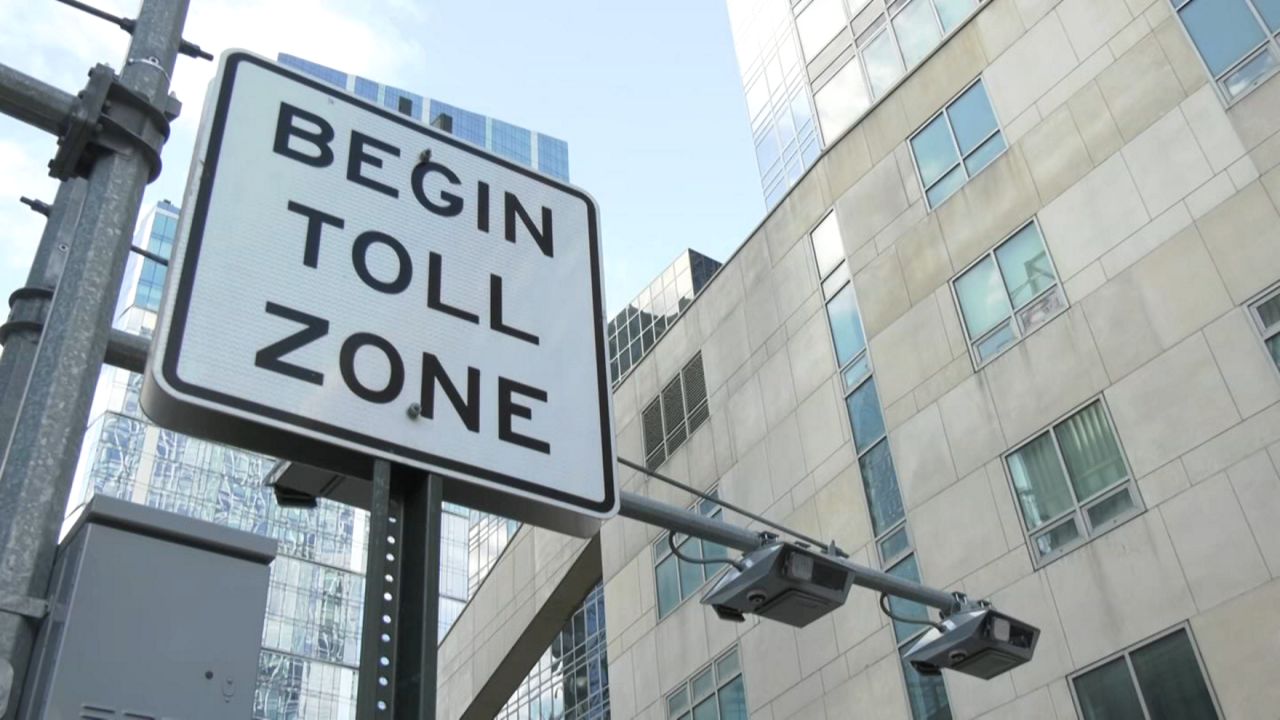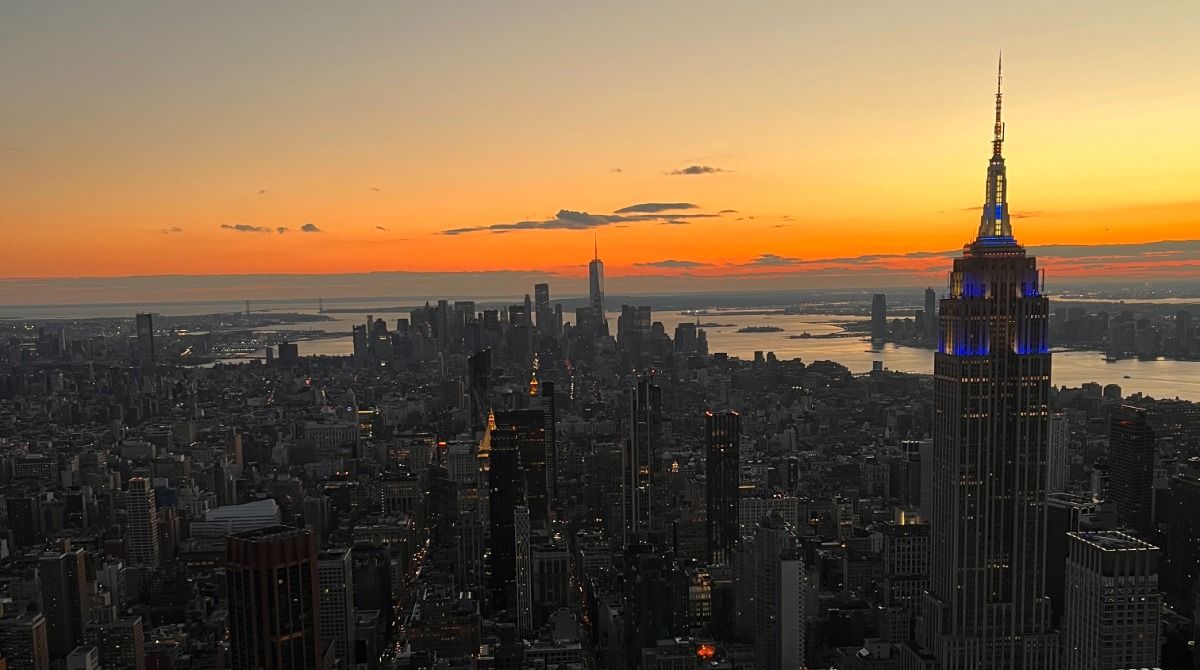NEW YORK — Mayor Eric Adams responded to rising gun violence and the recent shooting death of a New York City police officer with a speech Monday announcing a series of new city policies and actions, including expanded policing, more mental health outreach and involving every city agency in gun prevention efforts.
Adams’ speech was his first major policy statement as mayor, and came as a series of public safety crises — a police officer killed in the line of duty, a high-profile death on the subway — threatened to outpace his own drive to make a mark on a city still struggling through a pandemic.
In outlining his “Blueprint to End Gun Violence,” Adams, a former transit police officer and state Assembly member, cast himself as the right person to take on rising gun violence, and begin addressing it through immediate changes in police, long-term investments in youth employment and lobbying state lawmakers for changes to key laws.
“I'm ready for the battle,” he said in remarks to reporters after the speech. “My life experience has prepared me for this moment.”
Adams began by recounting the harrowing experiences he has already had in a little more than three weeks on the job: visiting crime scenes, consoling grieving families.
“I have seen a toddler’s blood-stained pink jacket in the street,” he said, referring to an 11-month-old who was shot in the cheek by a stray bullet last week.
He painted a picture of a metropolis on the verge, where residents “feel as if a sea of violence is engulfing our city.”
The speech saw Adams straddling several divides between law-and-order politics and progressive policing, a gap he has sought to fill since his early days as an officer who was an outspoken critic of the NYPD.
He called for expanded technological powers, including using facial recognition software in monitoring people coming into the city, while saying he would examine a residency requirement for city police officers — a key goal of some police reform groups. A majority of officers live outside the city.
He plans to ask state lawmakers to adjust laws that limited the crimes for which prosecutors can charge teenagers as adults, allowing criminal charges against 16- and 17-year-olds who do not cooperate with police — but framed it as a means to stop gang members exploiting children by forcing them to claim ownership of guns that are not theirs.
“If you wanna charge someone for other crimes in family court, I can live with that,” he told reporters. “Guns, we draw the line.”
Adams shrugged off the potential political conflicts of asking Democratic state lawmakers to enact potentially regressive changes to criminal justice reform laws, saying that progressives who attacked him for moderate policies on the campaign trail were ultimately unsuccessful.
“They did all of those things to me, but on Jan. 1, 2022, I'm the mayor,” he said.
Adams’ plan will see the NYPD expand a unit known as “neighborhood safety teams” and allow it to operate in a semi-plainclothes status. Officers will wear identifiable police clothing, such as an NYPD windbreaker, and be required to have a body camera that is turned on. They will operate out of unmarked cars.
The unit, which will launch in the next three weeks, will focus on 30 police precincts responsible for 80% of the city’s violent crimes.
With proper training and by picking the right officers, Adams said, the city can “avoid the mistakes of the past” — a reference to extensive plainclothes policing and stop-and-frisk tactics that disproportionately affected Latino and Black New Yorkers.
“The abuse of police tactics will not return under my administration,” he said.
Adams also said the NYPD will work with state law enforcement and Port Authority police to conduct inspections of vehicles entering the city, as well as people entering by bus. Those officers will use facial recognition technology, as well as technology that Adams said could identify people carrying weapons, to determine who to stop.
“We will use every available method to keep our people safe,” Adams said.
Adams said that he would require every city agency to have a dedicated coordinator for anti-violence efforts. An official in the Department of Sanitation, for example, would help coordinate sweeps of trash where residents say a gang member has hidden a cache of weapons, he said.
“Everyone believes that the gang and crime crisis is the NYPD’s problem. No, it is not,” Adams said. “Every agency in this city must be involved with the number one threat in our city, and that’s violence.”
The new efforts will not have any additional cost, Adams said, and will be paid for by reducing spending inefficiencies in city agencies, such as by moving police officers working in clerical duties to “crime fighting” roles. Adams has already tasked each agency with a 3% budget cut.
The plan also calls for expanding mental health outreach programs, more support for violence interruption efforts with people who have been shot to avoid retaliation and expanding assistance to people who age out of the foster care system.
The administration will also launch a summer youth employment program that will have the goal of providing a paid internship for every young New Yorker who wants one, Adams said.
“Just as we utilize precision policing, we must utilize precision prevention, reaching young people long before they reach for weapons,” he said.
Adams noted that many of his proposals require support from the federal government, state agencies, state lawmakers and local district attorneys.
He wants to see the state raise penalties for gun trafficking and give judges more discretion in applying bail to people with violent criminal histories. In picking judges for city positions, Adams said, their enthusiasm for these kinds of rules will be a top criteria.
Adams said he’ll ask district attorneys to “triage” gun cases ahead of other cases, and urge the courts to do more to reduce the backlog of gun cases.
At the federal level, Adams called for universal background checks on all gun purchases, making gun trafficking a federal crime and having federal prosecutors go after so-called “ghost guns” manufactured independently from known gun makers.
“New York, as your mayor, this is my number one priority: keeping you safe,” he said. “I campaigned on it. I will deliver on it.”








)